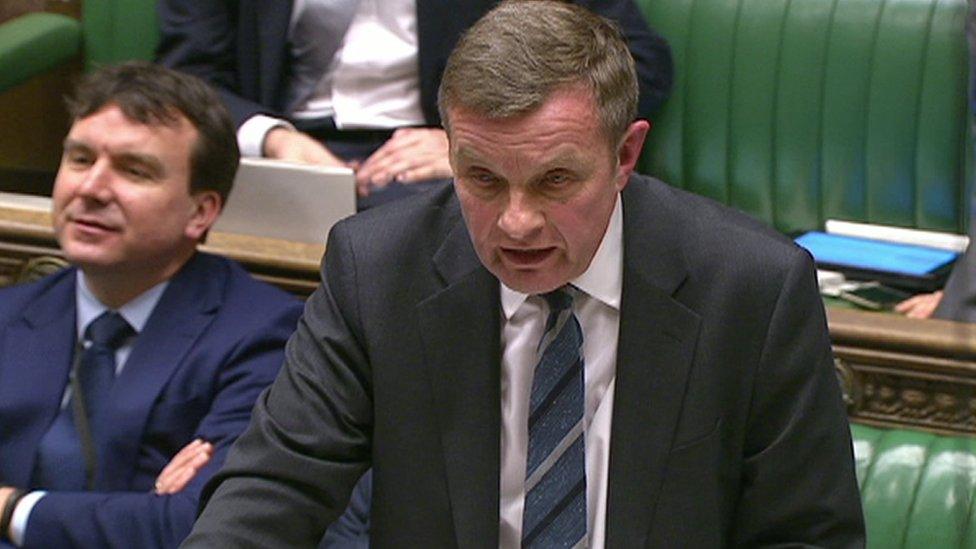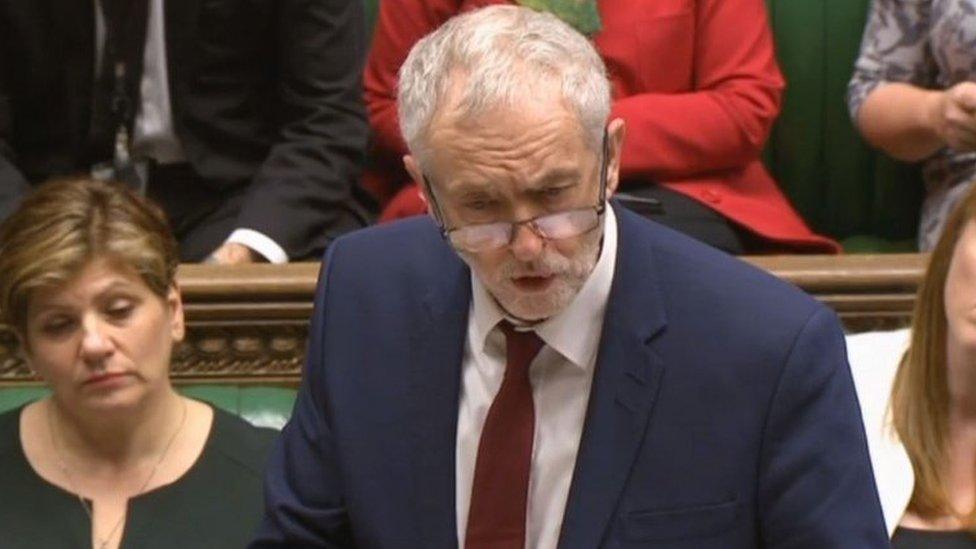Brexit rebellion avoided after 'meaningful vote' offer
- Published
- comments

Minister David Jones said the MPs would have a choice between a deal or no deal
The government has seen off an attempt to add conditions to its Brexit bill as a Conservative rebellion was avoided.
MPs rejected a bid by Labour's Chris Leslie to force the government to consult Parliament on the deal struck with the EU before it is finalised.
It came after ministers pledged that a "meaningful" vote would be offered.
Labour and some Tories had pushed for MPs to have a decisive say on the final terms, but the 326 to 293 vote meant the bill remained unchanged.
Seven Conservatives rebelled, while six Labour MPs voted with the government.
Several other attempts to amend the draft legislation, which if passed will authorise the prime minister to formally begin Brexit negotiations under Article 50 of the Lisbon Treaty, were also rejected during more than seven hours of debate.
More amendments will be considered on Wednesday before MPs hold a final vote on whether to back the bill.
Theresa May has already promised Parliament will get a say on the final deal, but critics, including some Conservatives, said they wanted more than the "take it or leave it" vote being offered.
Any possibility of a major Conservative rebellion appeared to be halted by comments from Brexit Minister David Jones.
Mr Jones said MPs would get a say on the final draft Brexit agreement before it was voted upon by the European Parliament.
"This will be a meaningful vote," he told MPs.
"It will be the choice of leaving the EU with a negotiated deal or not."
However, some MPs questioned whether any concessions had in fact been offered, with Downing Street playing down claims the government's position had changed.
'Worse deal'
Asked what would happen if Parliament rejected the Brexit deal or if there was no agreement with the EU to vote upon, Mr Jones said that in each scenario the UK would still leave the EU but "fall back on other arrangements".
This would effectively see the UK default to World Trade Organization trade rules, involving potential tariffs on exports and imports.
Opponents of Brexit have said this would cause real damage to British business, but supporters say the UK can live with the consequences if necessary as the UK would then be free to negotiate its own trade arrangements.

The Labour leader has ordered his MPs to vote for the Brexit bill
Mr Jones said the government wanted to avoid a situation in which ministers were sent back to the negotiating table to hammer out a better deal.
This, he said, would be hard given the two-year limit for talks and would also be "the surest way of undermining our negotiating position and delivering a worse deal".
Former chancellor Ken Clarke - the only Tory to vote against kickstarting the Brexit process last week - said Parliament should have the opportunity to shape the final deal, while former SNP leader Alex Salmond said MPs should have a genuine choice without the "Sword of Damocles" hanging over them.
Labour's Chuka Umunna said the choice facing MPs was "unacceptable", ex-Lib Dem leader Nick Clegg described it as a "symbolic handout" while Green Party leader Caroline Lucas said MPs were being "duped".
'Jihadis' comparison
But Labour's font bench claimed the move as a "significant victory" in response to its repeated demands for a "meaningful" vote at the end of the two-year negotiation process.
The party withdrew its proposed amendment before Mr Leslie's was defeated.
Conservatives Mr Clarke, Bob Neill, Andrew Tyrie, Claire Perry, Anna Soubry, Antoinette Sandbach and Heidi Allen, defied their party whip.
Ms Perry told MPs the tone of the debate "sometimes borders on the hysterical", before adding: "I feel like sometimes I am sitting along with colleagues who are like jihadis in their support for a hard Brexit."
Conservative MP Claire Perry said the tone of the debate 'borders on the hysterical'
Teasing her colleagues, she said: "No Brexit is hard enough - 'begone you evil Europeans, we never want you to darken our doors again'. People say: 'Steady on, Claire', but I am afraid I heard speeches last week exactly making that point."
On the Labour benches, Frank Field, Ronnie Campbell, Kate Hoey, Kelvin Hopkins, Graham Stringer and Gisela Stuart voted with the government.
Labour leader Jeremy Corbyn, who backed the Remain side in last year's EU referendum, has ordered his MPs to support the government's bill, whether his party's amendments are accepted or not, in the third reading vote expected on Wednesday.
Mr Corbyn argues that it would be undemocratic to ignore the will of the people, as expressed in last June's EU referendum.
Shadow business secretary Clive Lewis has vowed to oppose the bill unless Labour amendments are passed in the Commons.
Frontbench members of parties are generally expected to resign from their post if they ignore a three-line whip.